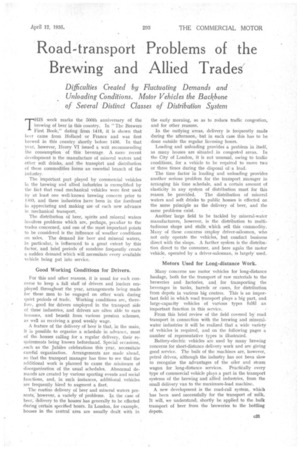Road-transport Problems of the Brewing and Allied Trades
Page 53

If you've noticed an error in this article please click here to report it so we can fix it.
Difficulties Created by Fluctuating Demands and Unloading Conditions. Motor Vehicles the Backbone of Several Distinct Classes of Distribution System
THIS week marks the 500th anniversary of the brewing of beer in this country, In "The Brewers• First Book," dating from 1418, it is shown that beer came from Holland or France and was first brewed in this country shortly before 1436. In that year, however, Henry VI issued a writ recommending the consumption of this beverage. A more recent development is the manufacture of mineral water S and other soft drinks, and the transpbrt and distribution of -these commodities forms an essential branch of the industry.
The important part played by commercial vehicles in the brewing and allied industries is exemplified by the fact that road mechanical vehicles were first used by at least one well-known brewing concern prior to 1300, and these industries have been in the forefront iu appreciating and making use of each new advance in mechanical transport.
The distribution of beer, spirits and mineral waters involves problems which are,, perhaps, peculiar to the trades concerned, and one of the most important points to be considered is the influence of weather conditions on sales. The demand for beer and mineral waters, ia particular, is influenced to a great extent by this factor, and brief periods of sunshine frequently create a sudden demand which will necessitate every available vehicle being put into service.
Good Working Conditions for Drivers.
For this and other reasons, it is usual for such concerns to keep a full staff of drivers and loaders em ployed throughout the year, arrangements being made for these men to be engaged on other work during quiet periods of trade. Working conditions are, there fore, good for drivers employed in the transport side of these industries; and drivers are often able to earn bonuses, and benefit from various pension schemes, as well as receiving a good weekly wage.
A feature of the delivery of beer is that, in the main, it is possible to organize a schedule in advance, most of the houses calling for a regular delivery, their requirements being known hefbrehand. Special occasions, , such as the Jubilee celebrations this year, necessitate careful organization. Arrangements are made ahead, so that the transport manager has time to see that the additional work is planned to cause the minimum of disorganization of the usual schedules. Abnormal demands are created by various sporting events and social functions, and, in such instances, additional . vehicles are frequently hired to augment a fleet.
The routine delivery of beer and mineral waters presents; however, a variety of problems. In the case of beer, delivery to the houses has generally to be effected (hiring certain specified hours. In London, for example, houses in the Central area are usually dealt with in
the early morning, so as to reduce traffic congestion, and for other reasons.
In the outlying areas, delivery is frequently made during the afternoon,but in each case this has to be done outside the regular licensing hours.
Loading and unloading provides a problem in itself, as many houses are situated in congested areas. In the City of London, it is not unusual, owing to traffic conditions, for a vehicle to be required to move two or three times during the disposal of. a load.
The time factor 'in loading and unloading provides another serious problem for the transport manager in arranging his time schedule, and a certain amount of elasticity in any system of distribution must for this
reason be provided. The distribution of mineral waters and soft drinks to public houses is effected on the same principle as the delivery of beer, and the same problems exist, Another large field to be tackled by mineral-water manufacturers, however, is the distribution to multitudinous shops and stalls which sell this commodity. Many of these concerns employ driver-slesrnen, who not only operate the vehicles, but conduct business direct with the shops. A further system is the distribution direct to the consumer, and here again the motor vehicle, operated by a driver-salesman, is largely used.
Motors Used for Long-distance Work.
Many concerns use motor vehicles for long-distance haulage, both for the transport of raw materials to the breweries and factories, and for transporting the beverages in tanks, barrels or cases, for distribution from depots in various big centres. This is an important field in which Toad transport plays a big part, and large-capacity vehicles of various types fulfil an important function in this service.
From this brief review of the field covered by road transport in connection with the brewing and mineral. water industries it will be realized that a wide variety of vehicles is required, and on the following pages a number of representative types is illustrated.
Battery-electric vehicles are used by many brewing concerns for short-distance delivery work and are giving good service, The bulk of the machines are, however, petrol driven, although the industry has not been slow to recognize the advantages of the oiler and steam wagon for long-distance services. Practically every type of commercial vehicle plays a part in the transport systems of the brewing and allied industries, from the small delivery van to the maximum-load machine.
A new development is the road-rail system, which has been used successfully for the transport of milk. It will, we understand, shortly be applied to the hulk transport of beer from the breweries to the bottling depots.












































































































